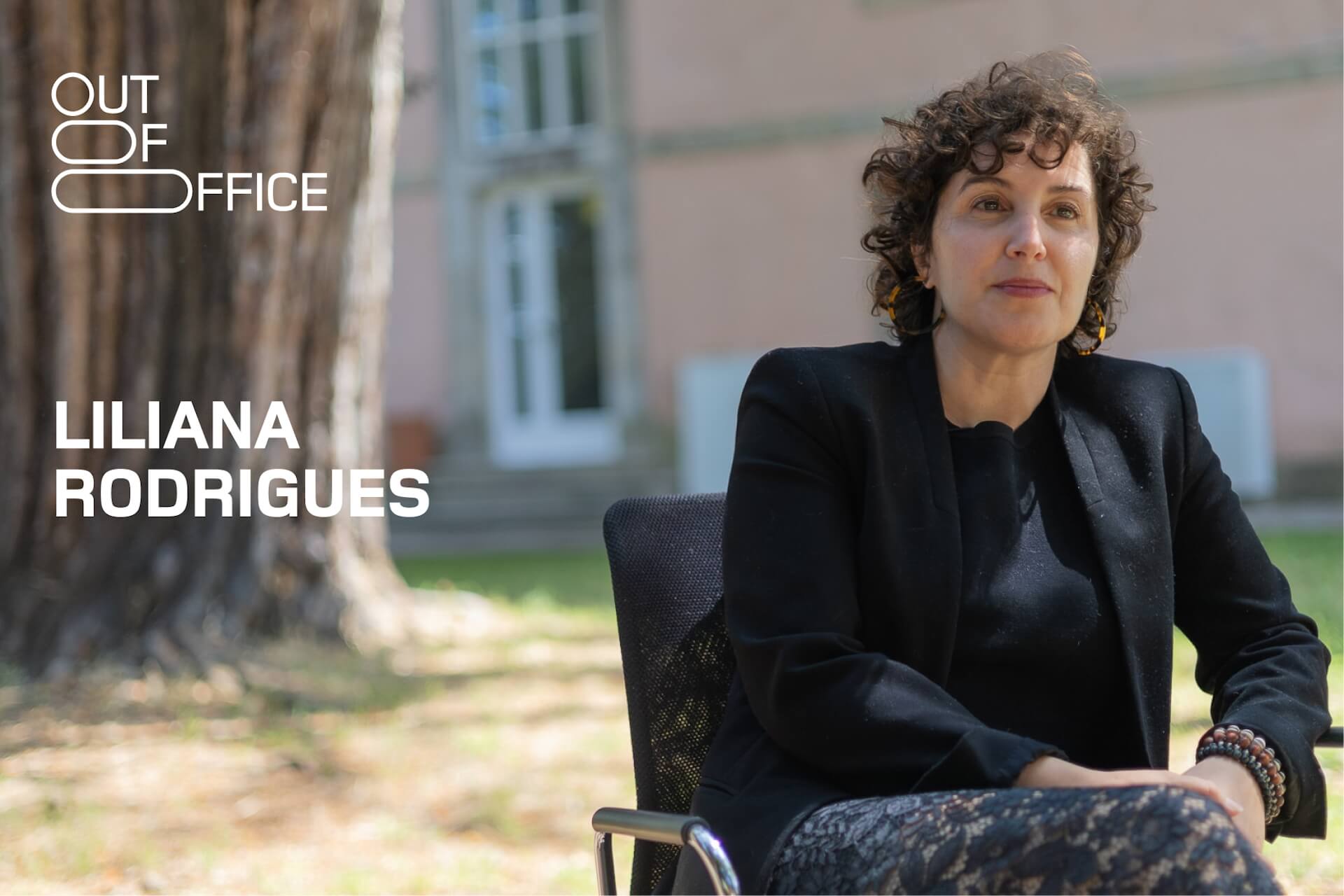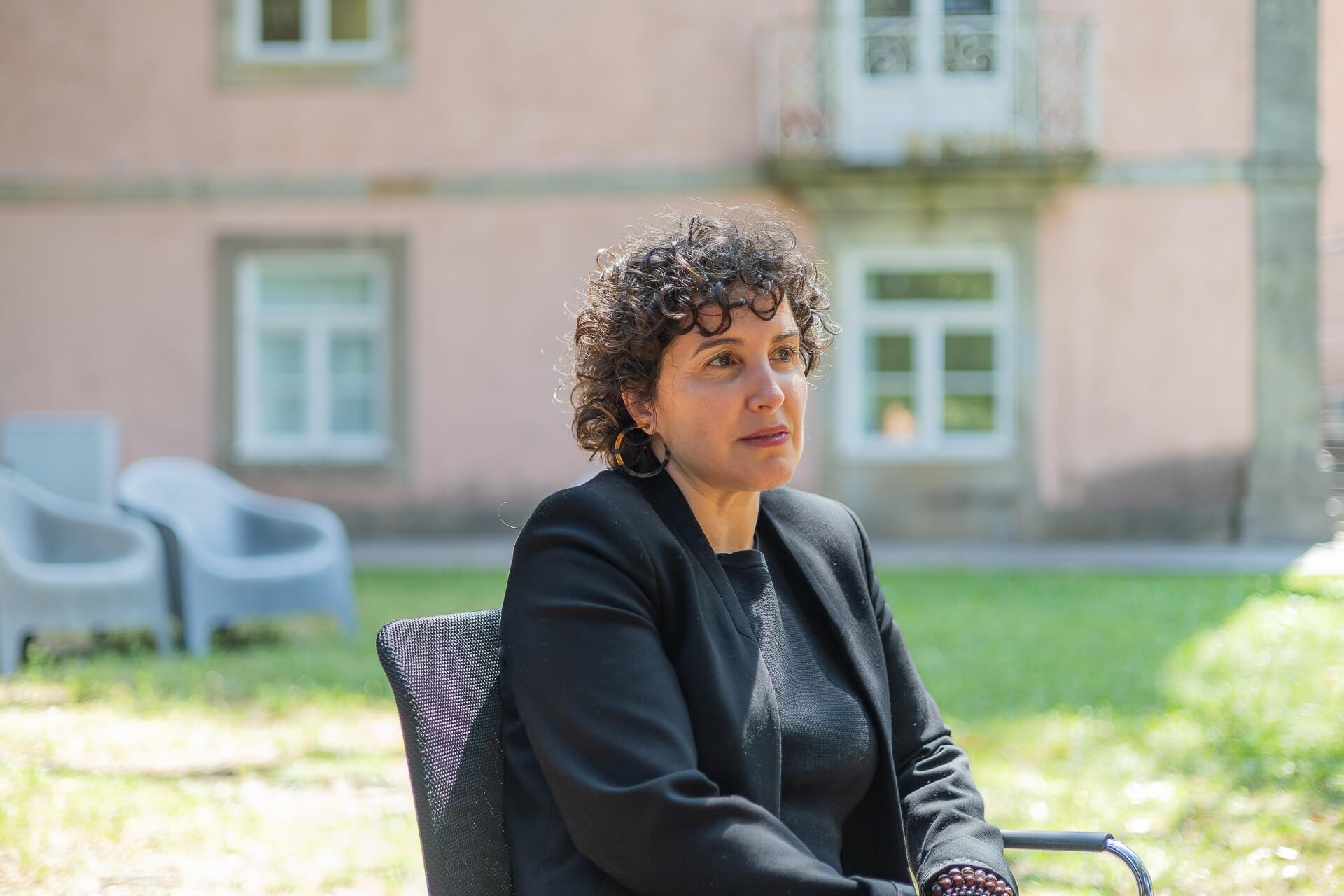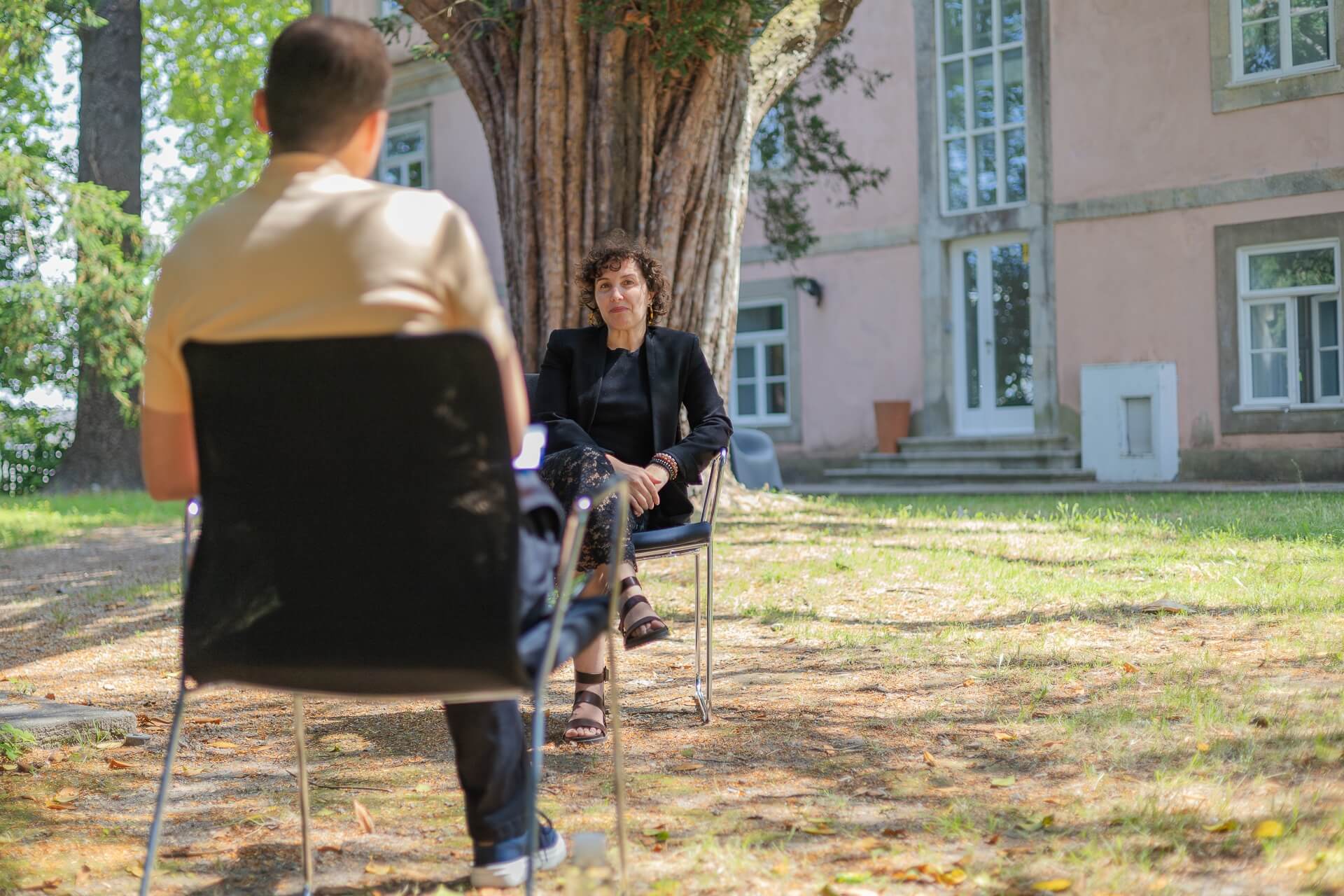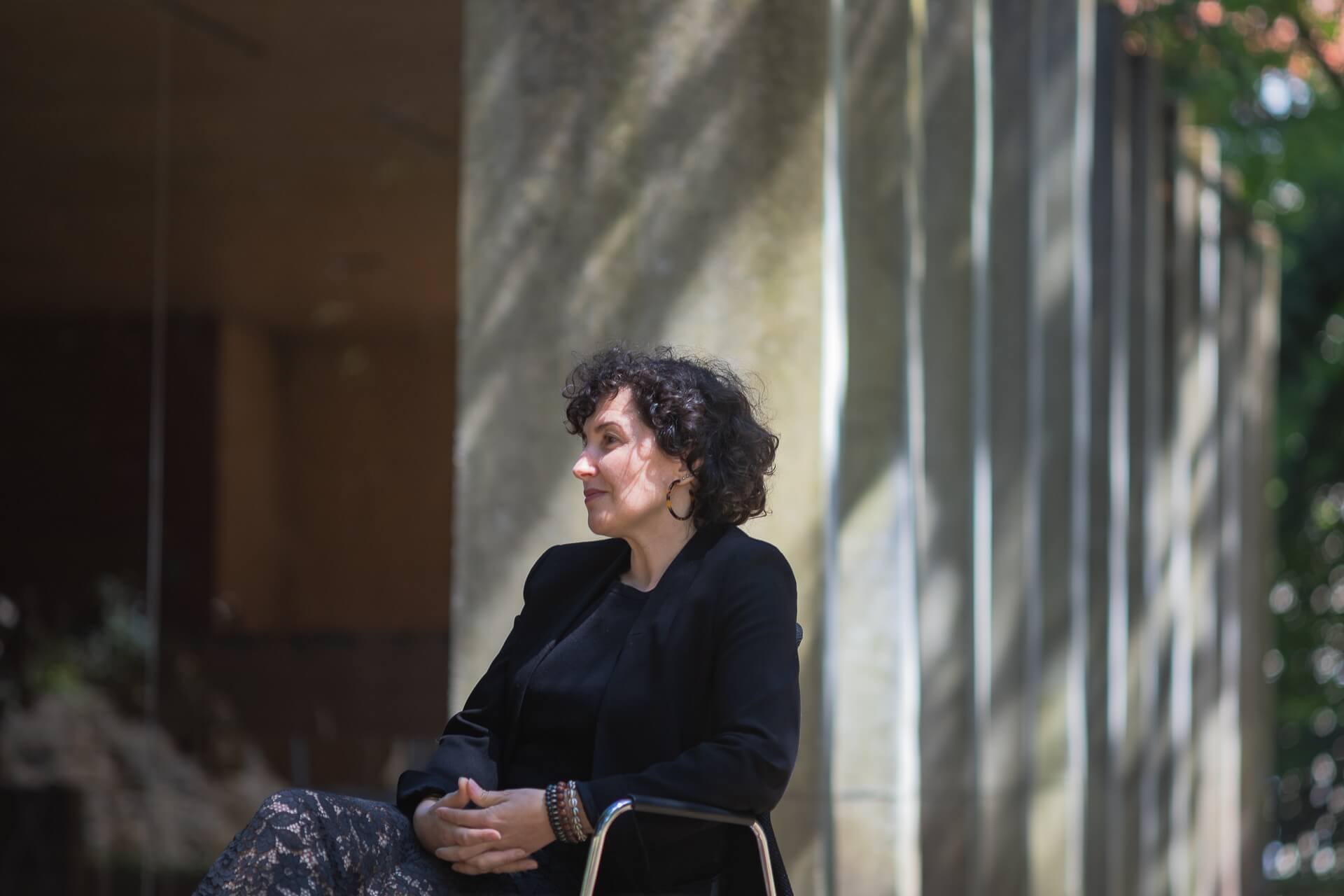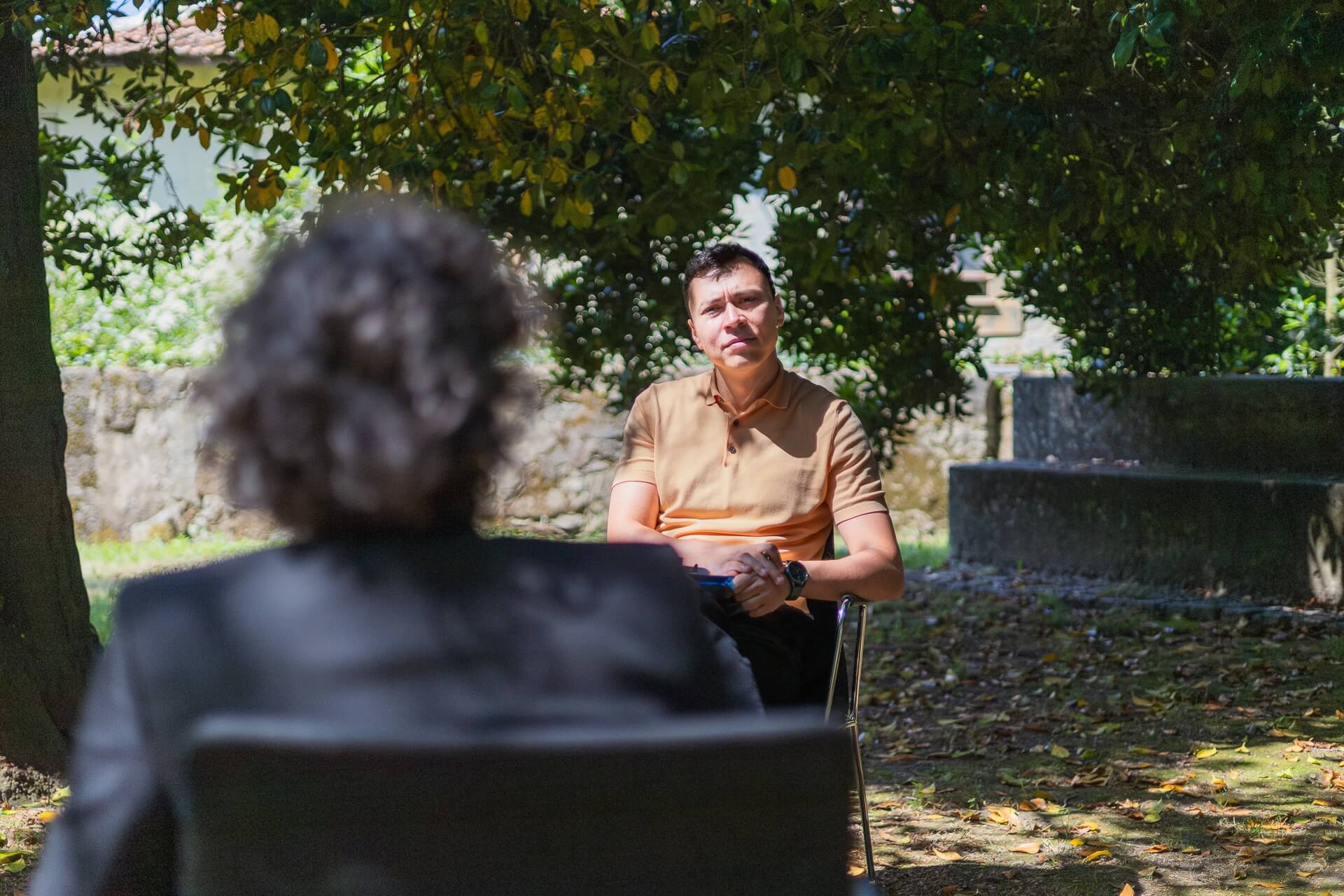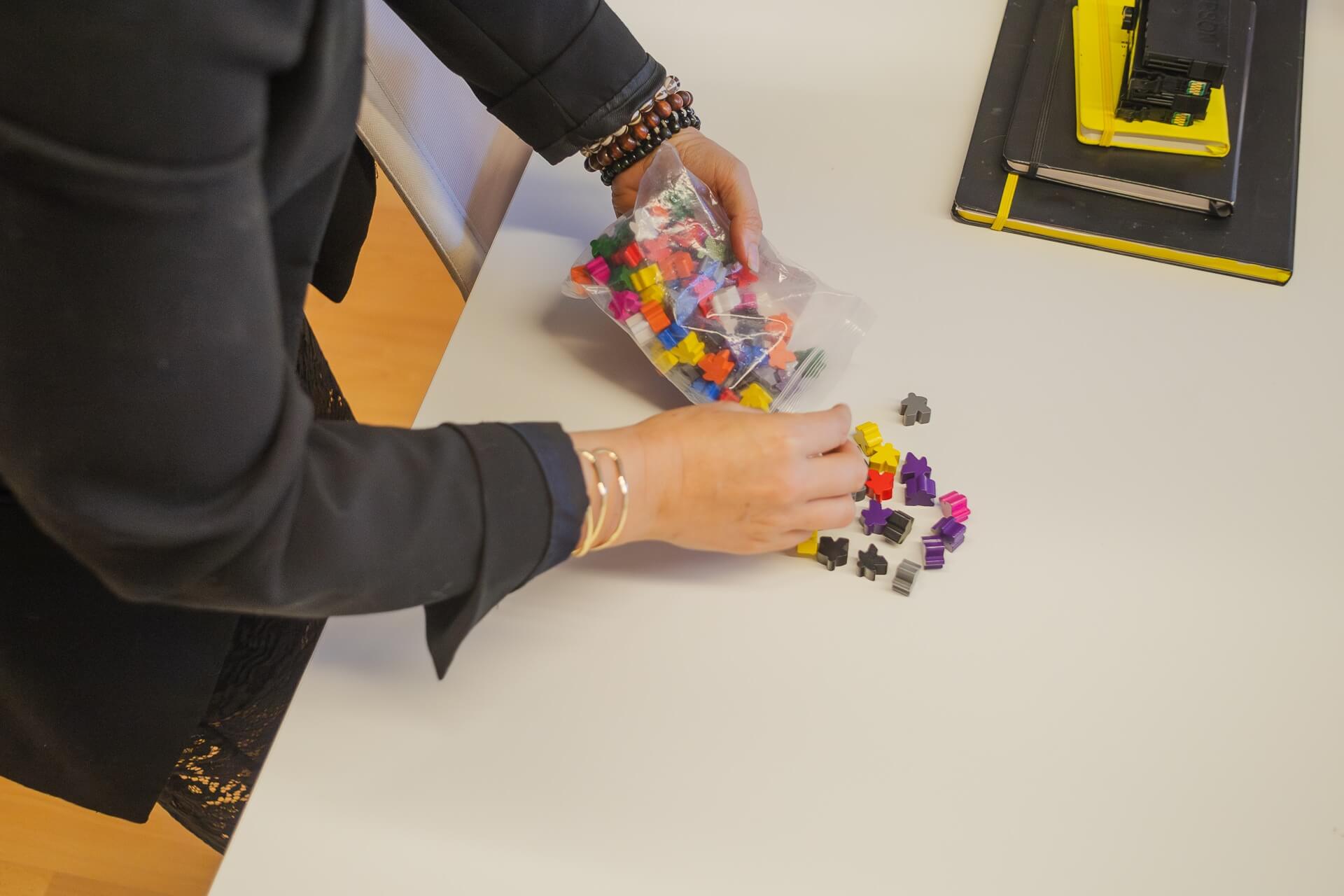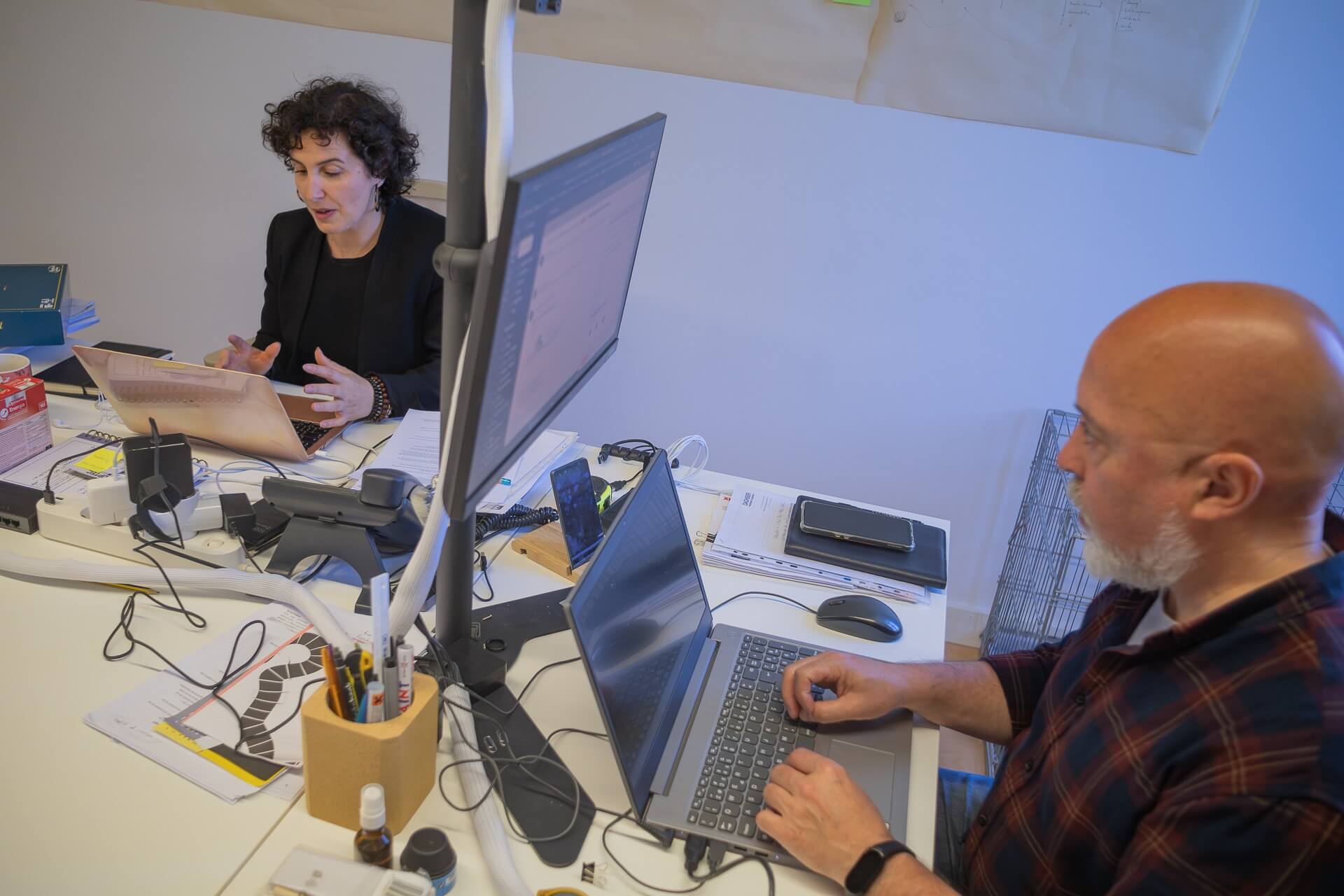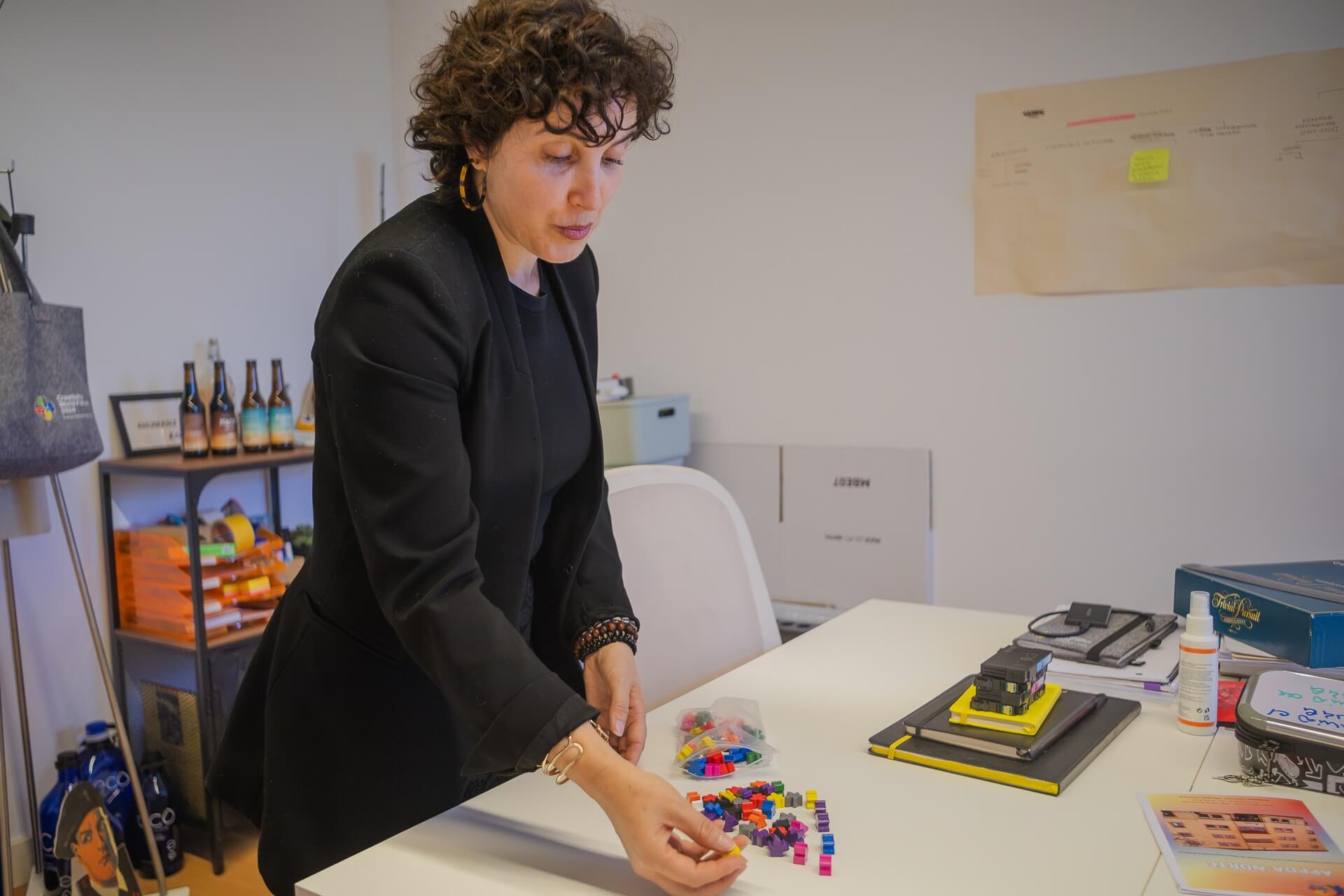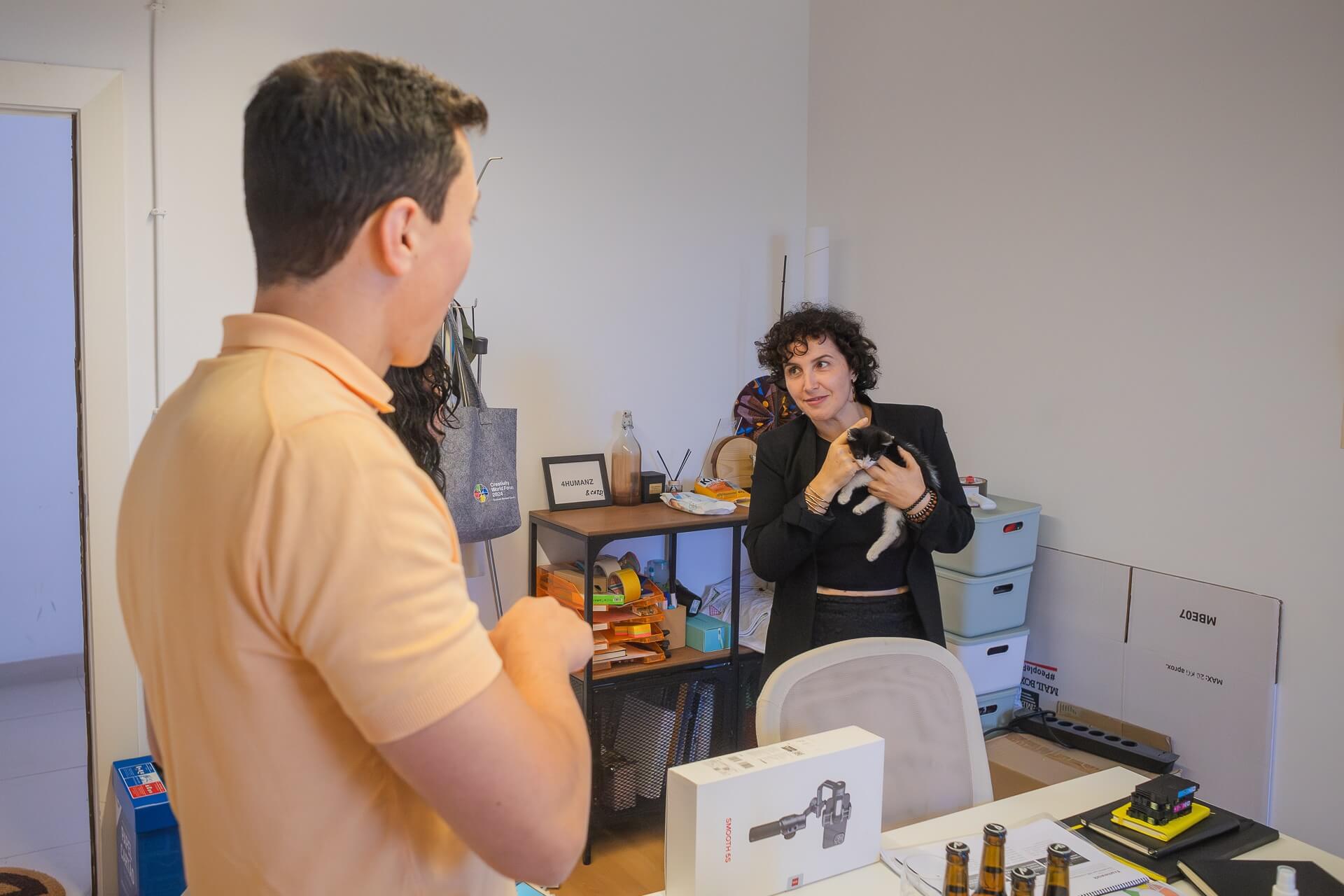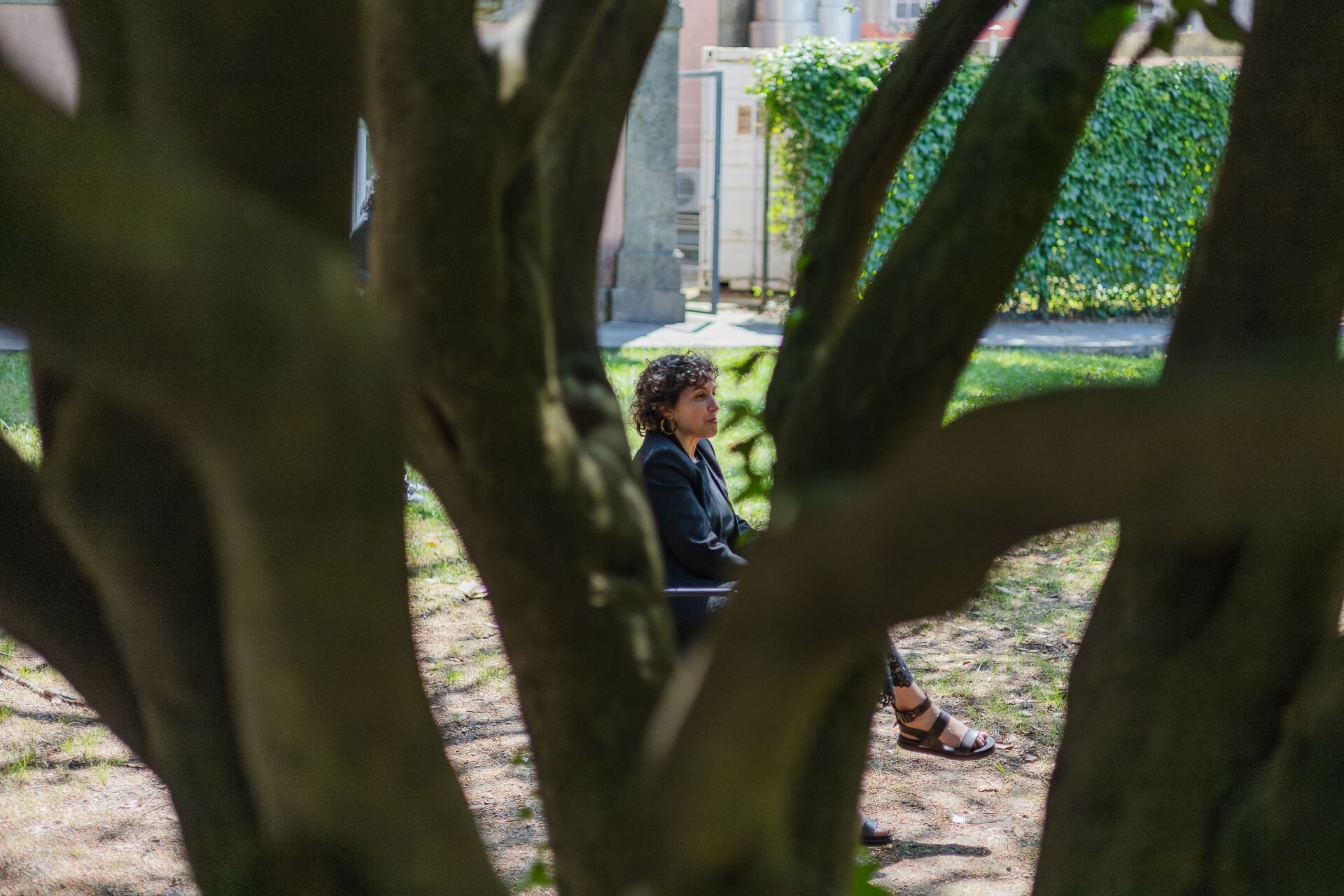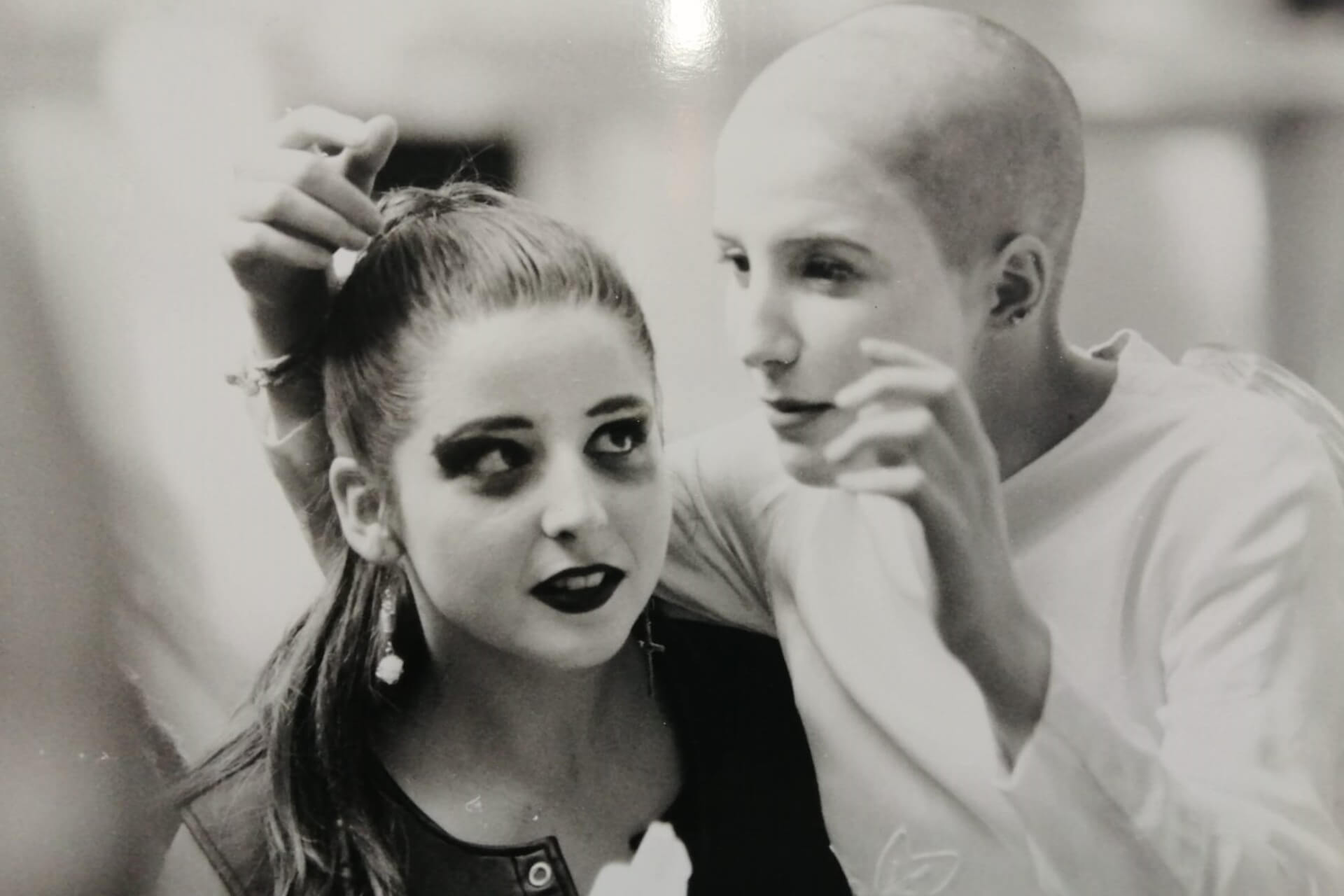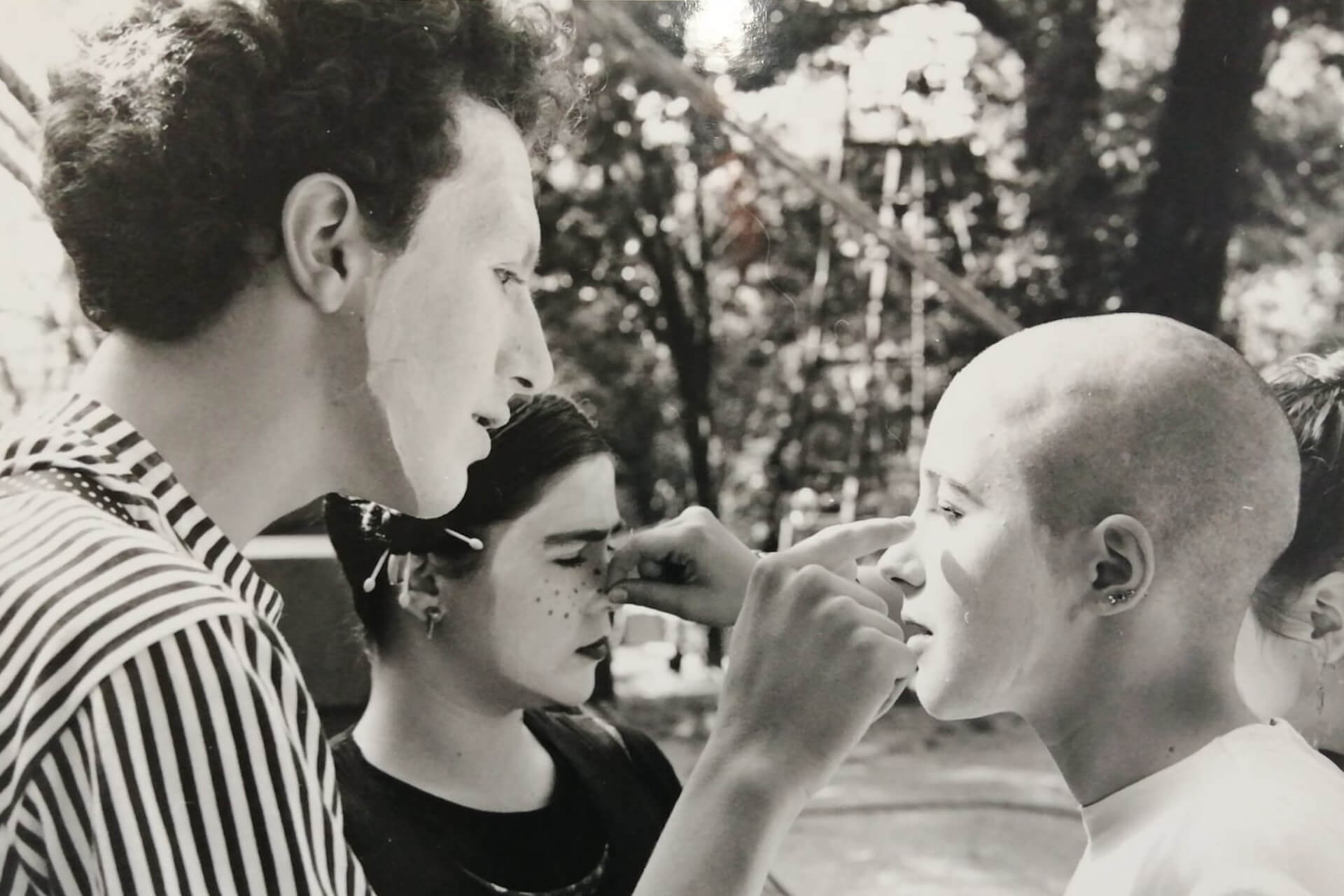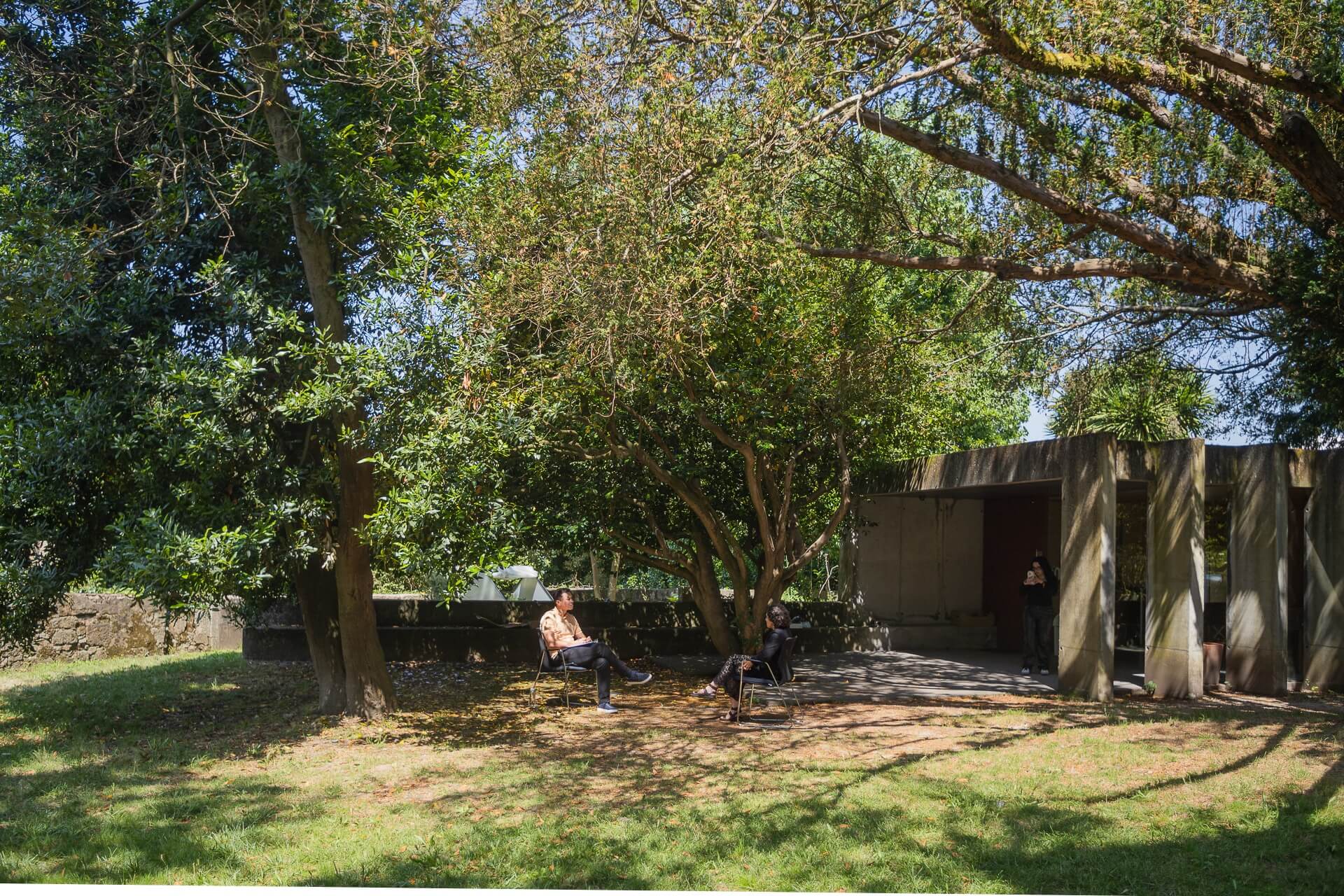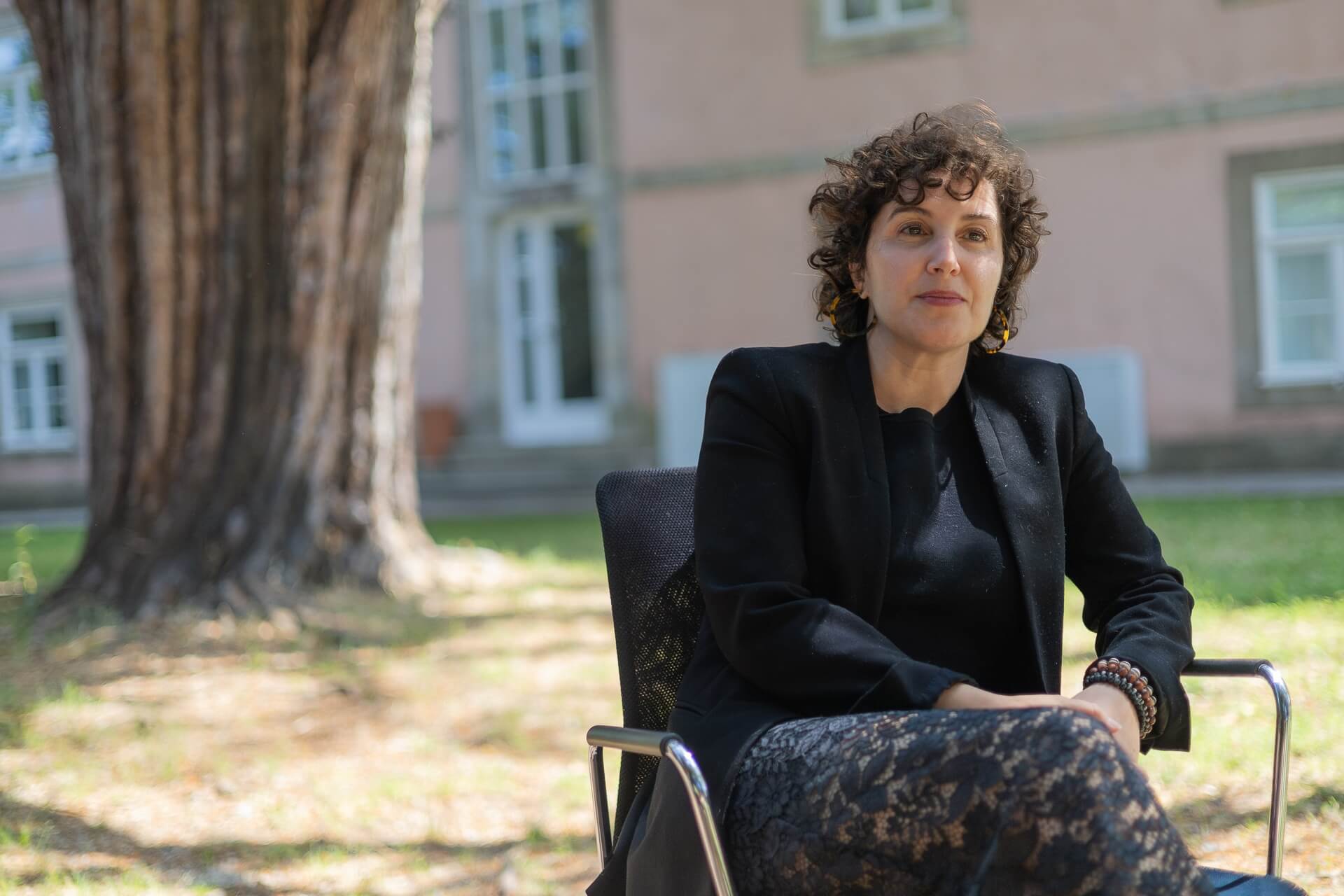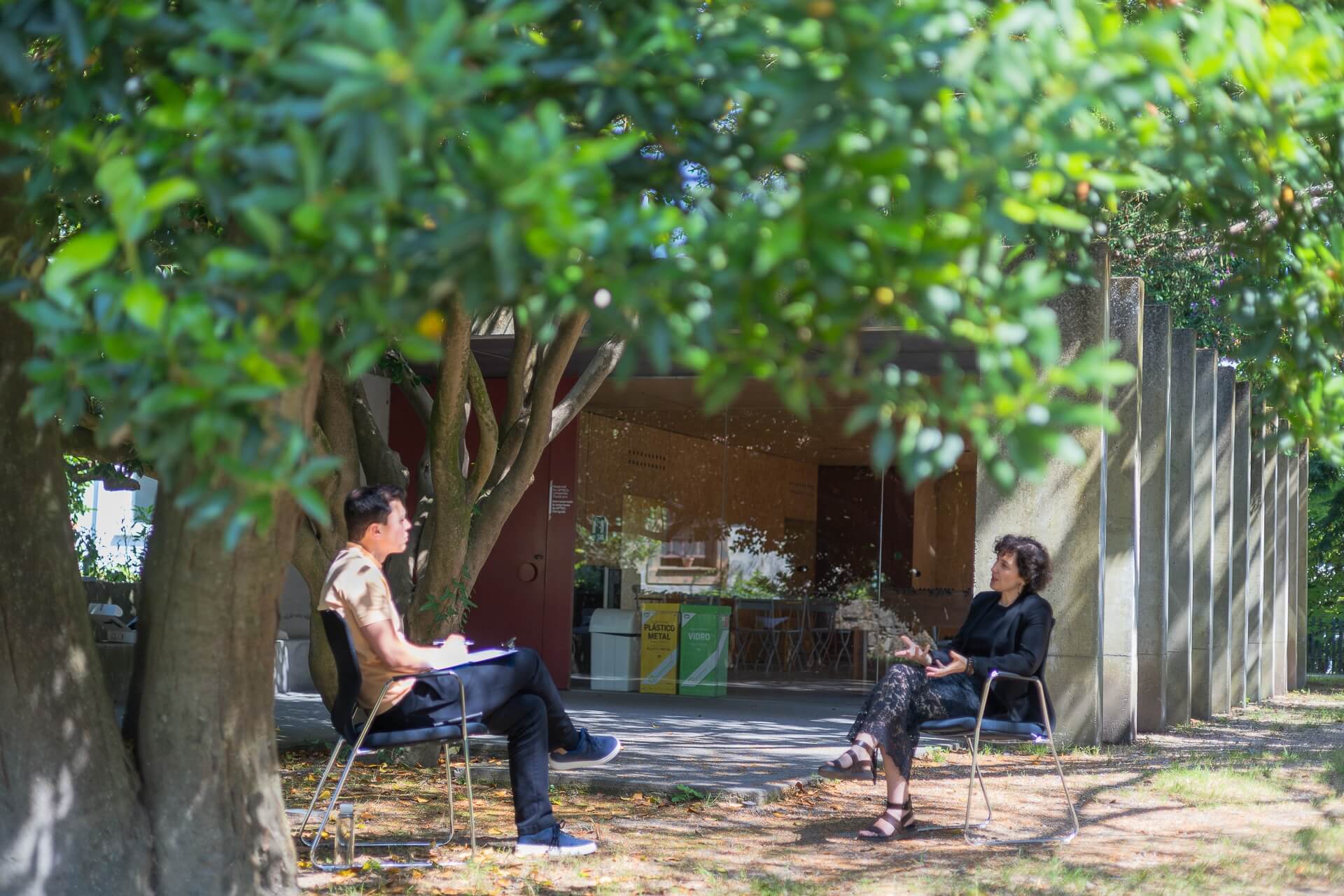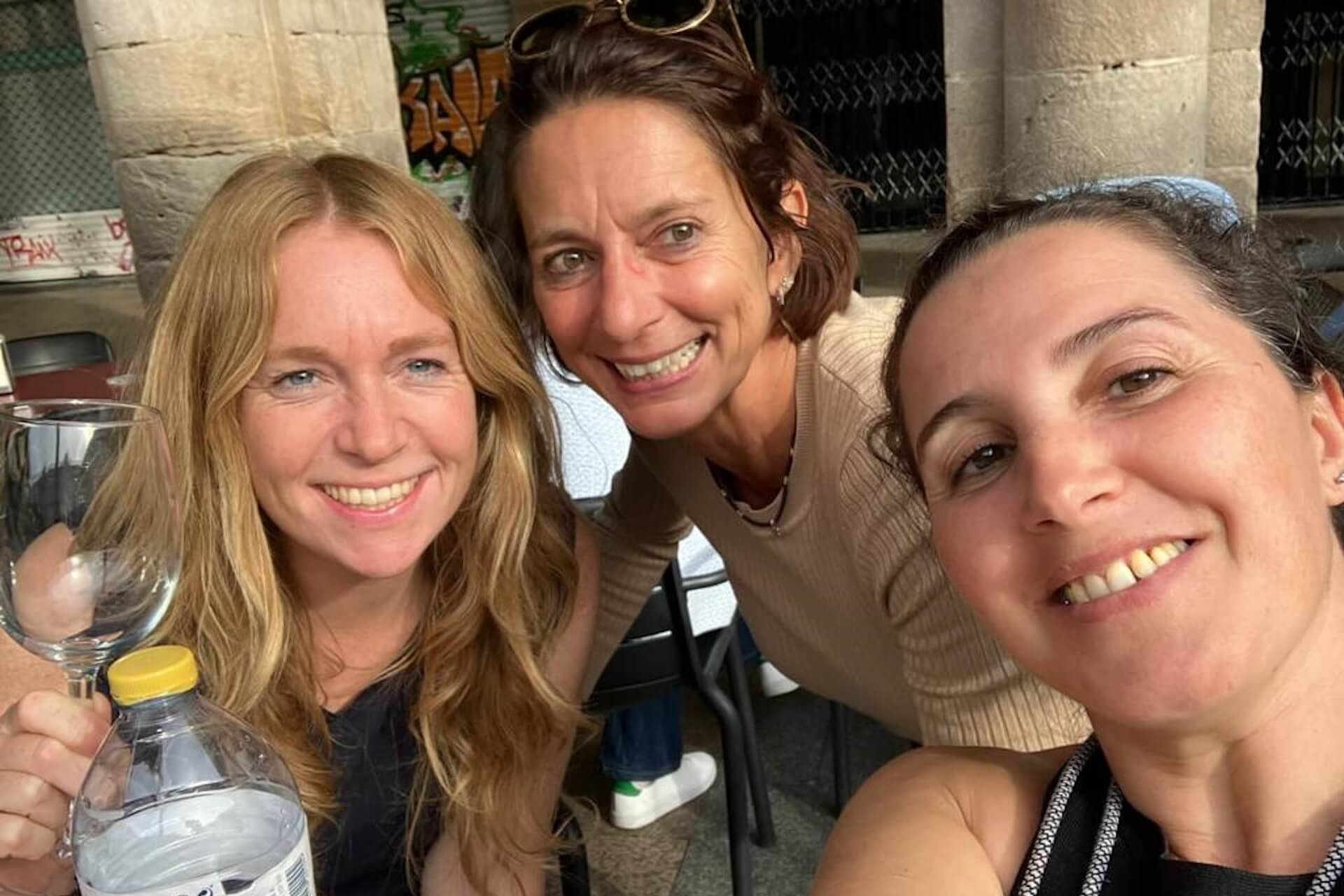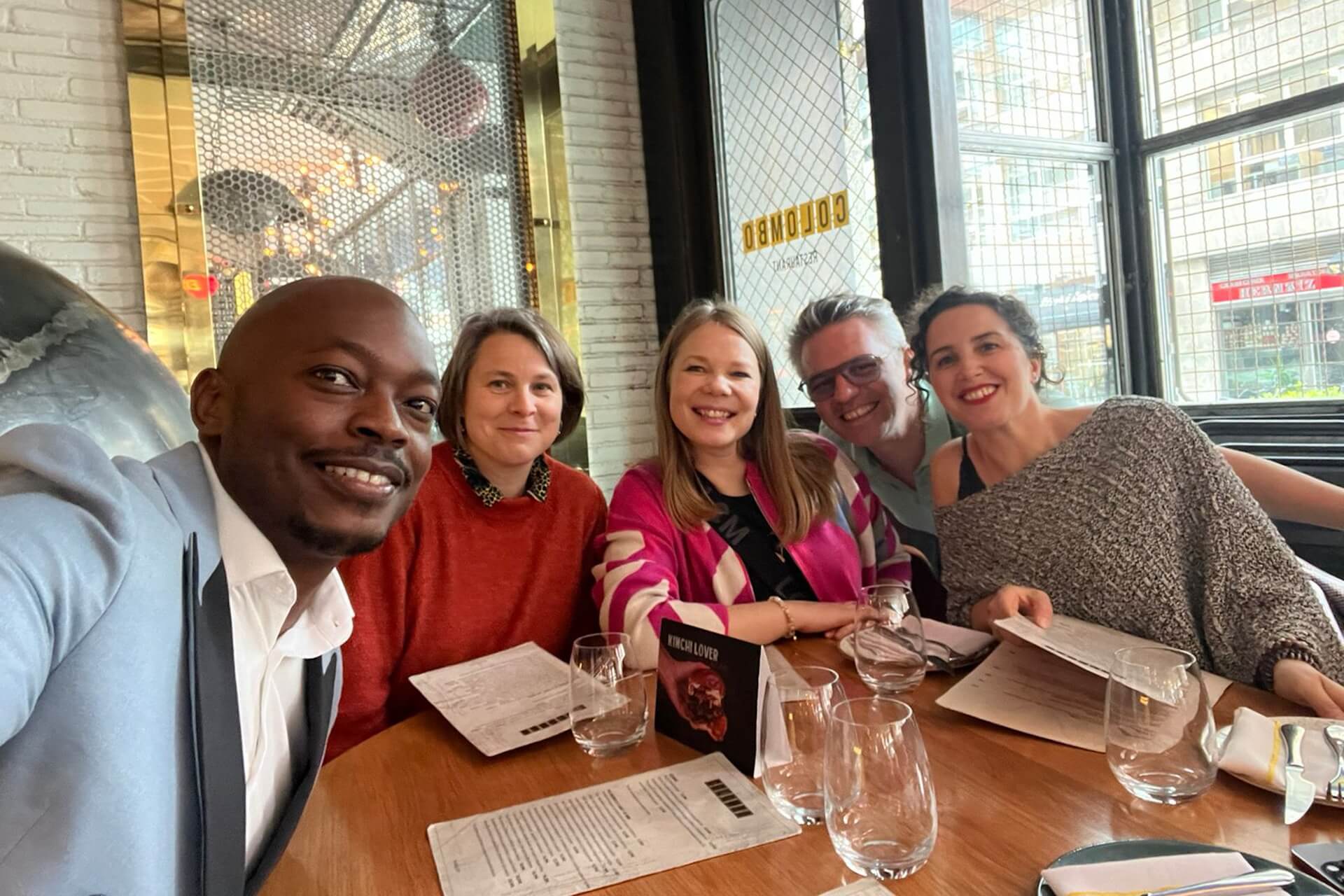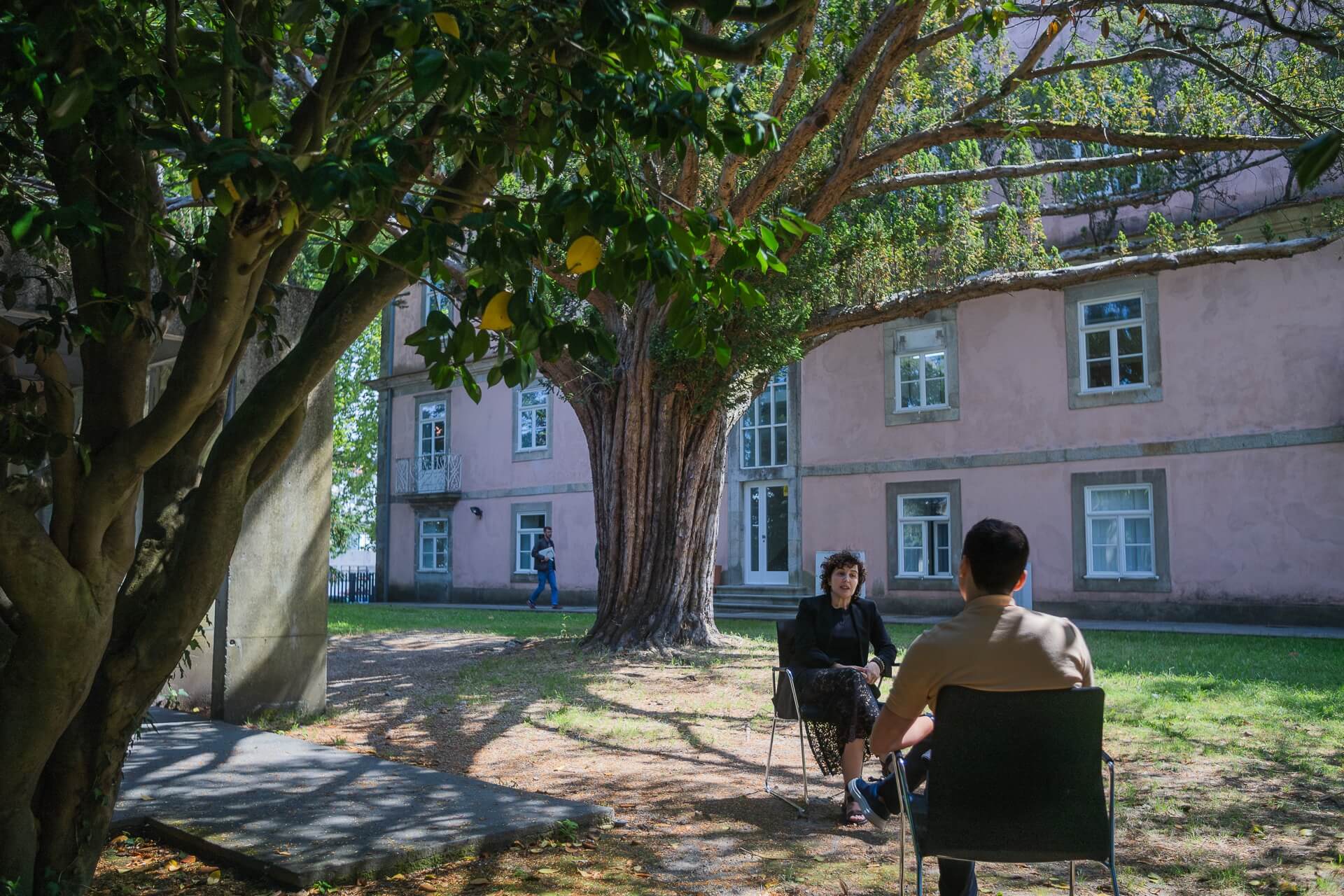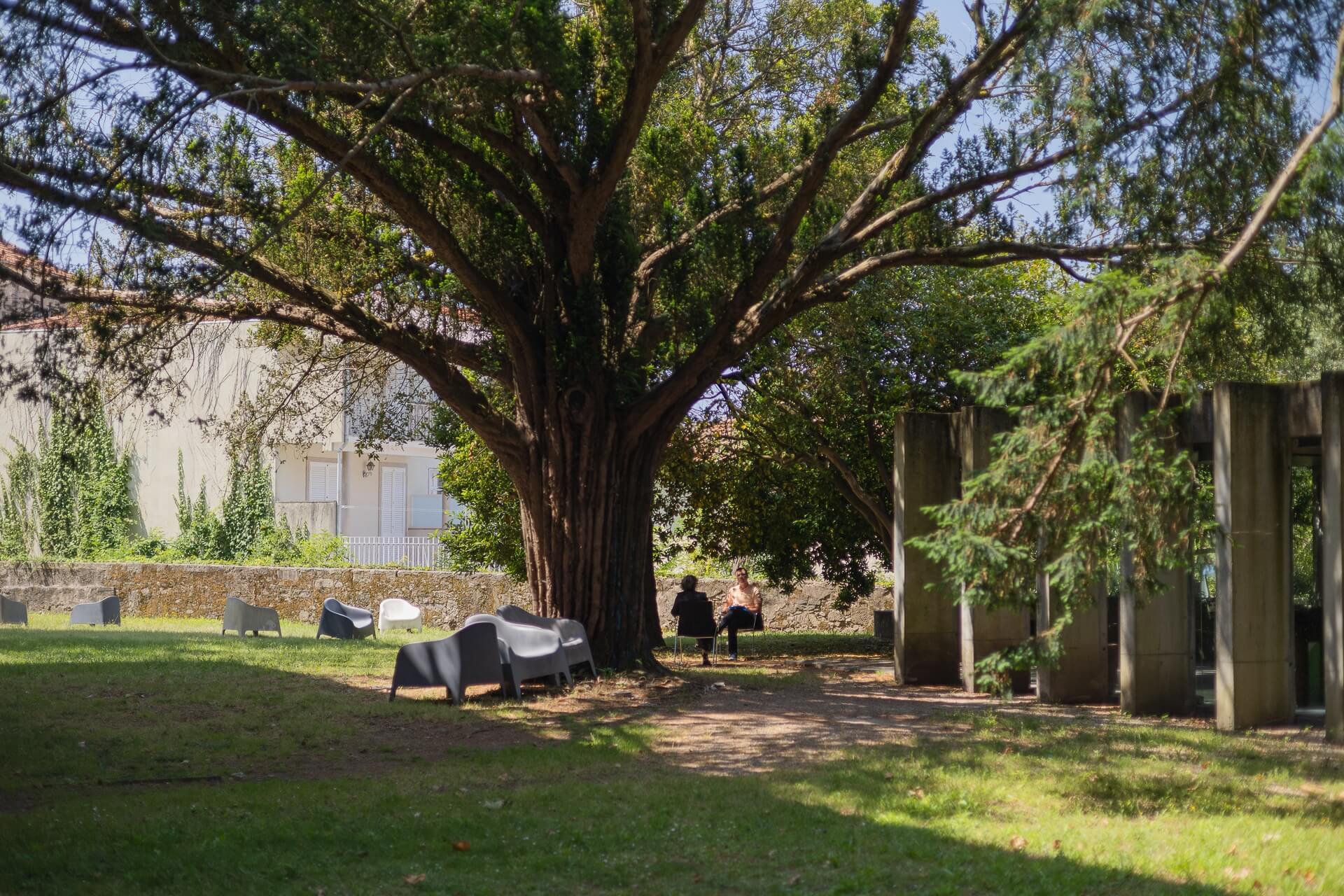Liliana Rodrigues: “I don’t like fear to conquer me”
Liliana Rodrigues: “I don’t like fear to conquer me”
This month's Out of Office highlights the CEO of 4Humanz, Liliana Rodrigues, who works to improve users' lives and the world. She grew up climbing trees, fell, got up, and now walks, climbs, dives, fights, shoots and creates. Despite all the personal and professional challenges she faces, she doesn't give up her freedom to be Liliana. This is the story of Liliana, who believes that we always have something in common with those we don't like.
What is 4Humanz?
It is a consultancy and research company that is applied to human-centred design. More than Humans (other animals and artificial agents) in the development of aesthetically beautiful, inclusive and sustainable products and services for the person and the community, with a transdisciplinary approach between science, technology and design, in close articulation with the University, favouring participatory design methods and co-creation in favour of creative solutions that respond to the needs and expectations of People and their Ecosystem. Making life and the world better for users. We work for all humans, whatever stage of life they are in. We currently have a project for people with autism, which is much broader. We’re talking from pre-school to adulthood. Ageing is where we do a lot of work, but it’s not the only area.
And what motivated you to create 4Humanz?
Actually, the first version of 4Humanz wasn’t started by me. It was a group of professors and researchers from the University of Porto and Brasilia. They asked me to bridge the gap between the two since I had already worked at the University of Porto and for a while at the University of Brasilia, so I married the two worlds, so to speak. We currently have a completely different team, with six members. The only people who remained from the first version were me and one of the professors from U.Porto, and we created a 4Humanz 2.0 that was in line with the values and vision we had for it.
What was the purpose of this 4Humanz 2.0?
“Beauty will save the world”, as Dostoiévski used to say, and in reality, that’s what we want. We want to create products and services that improve the world. Humanity itself is going through a dark phase. We want to contribute to improving things, and human-centred design helps a lot with that. We work extensively in user research, one of the company’s great pillars. It is all about knowing expectations and designing products to meet those needs, not just because it’s pretty or profitable.
There are now six of you; how are you split up?
My primary area is design, although I was also in medicine for a few years. I’m more involved in management, creative direction and customer contact. We have three interaction designers and researchers. We work very closely with U.Porto. Often, what we help with in some projects is where the research stops because it’s not tangible. We make the research data tangible into products or services.
What do you want for 4Humanz going forward?
We want to build on our new partnerships with African partners. It’s a continent that interests us a lot. Just as they have a lot to give us, we also have a lot to provide them with. We want to deepen the partnerships we have with the University of Porto. We have several projects we’re writing together, one of which is an Erasmus programme that the University of Porto is coordinating and managing. Hence, our aim is to make the company grow. It’s going from strength to strength, which is very good for us.
“I want for others what I want for myself”
One such example is the Movement workshop you organised at UPTEC. How did this idea come about? And for what purpose was it organised?
We work a lot in the area of somaesthetics; in other words, we are all, above all, corporeal beings, and we often forget that. We forget that we have a body and need to know how it works. And we’re thinking of combining pilates with somaesthetics, with a trainer who works in that area, doing these workshops, and energising the community. We have an incredible space outside, don’t move much, and spend hours and hours in front of the computer. This workshop was very much in that direction, to reconnect the body with the mind and get a sense of how we function and interact with the environment. We want to get the UPTEC community even more involved with the outside community.
And with the community here at UPTEC Baixa, do you have a different connection dynamic?
Here, it’s a little easier to bring together these “cocoons” in which we all live and work. It’s something that comes naturally. We have solid links with some of the other companies here. We have our own groups and life outside UPTEC itself, and we collaborate a lot here, which helps us a lot, but also outside. We have a very, very cohesive community. I only have a little contact with the technology companies. However, we also have that aspect, which we’re trying to change.
In what way?
The Faculty of Fine Arts challenged these companies to integrate some designers for internships. Still, technology companies are facing a challenge because they need a designer to mentor these students. As part of the UPTEC Community, it could be exciting, and we could help these students with the mentoring they need. At the same time, the technology companies still need these students. We liaise with the technology companies, try to find out their needs and what they want from the student, and guide that student throughout the internship so they can do a better job and meet what the technology companies need. And this is one of the ways of creating bridges between the various UPTEC companies. With all this, we hope other UPTEC companies linked to design follow suit and help build this bridge.
How did your connection to UPTEC come about?
It was through a professor from the University of Porto, a member of our Advisory Board. At the time, we were at ANJE, and he told us about UPTEC; he thought we’d be a better fit here at UPTEC, and he was absolutely right (laughs). They accepted us here, we’ve been trying to make our contribution, and they’ve also given us a lot of support, even in attracting new clients, in liaising with i3S, with whom we have a project, a game we’re developing for 10th and 11th graders, for example, and with some Erasmus projects. It’s been a vital and fruitful connection.
4Humanz's main achievements?
One of the main achievements is the very cohesive international network of partners. It is very transversal; we have a lot of people in different areas. The connection to U.Porto and the strengthening of that same connection is a major goal for us. We are trusted by all our national and international clients. Having a happy, creative, and motivated team is very motivating. I want for others what I want for myself.
Next steps?
We aim to continue growing and working in exactly the same way as we have so far in order to fulfil all our objectives and build more bridges between academia, industry, and the community.
Liliana's childhood left deep marks on her personality, some of them literal, which still influence the decisions she makes today. Her connection to nature is umbilical and nurtured every year on the 300-plus kilometre hikes she takes alone through the middle of the mountains. Influenced by the values of Japanese culture, the practice of Aikido, climbing, and diving are challenges that put her in a constant state of personal endeavour.
Where were you born? How were yours?
I’m from Porto, Maia, and I have a solid Minho streak. Part of my family is from Minho, so I’m a woman from the North (laughs). My early life was spent between Porto and Braga. My grandparents had a farm, so I’m very attached to the land and the animals. I had a very happy childhood. Rebellious, always barefoot. I even went for a few days out of forgetfulness – although I’m not a head in the air – but sometimes I’d forget and go to school barefoot (laughs). My grandparents were called to school by the teacher, especially in the summer, because I forgot my shoes at home. I’ve always lived in houses, and I’ve never lived in a flat, so I didn’t live in that bubble. It was easier to walk around the garden and indoors in bare feet. Those were pleasing years. I’m the middle sister; I have a younger brother and an older sister. We’re different from each other. I was never a child who got too stuck in, so to speak, because I always had a lot of freedom to climb trees to fall, and the scars on my head, which I discovered by chance, are worth mentioning.
By chance?
It was a funny moment (laughs). I did theatre in college and high school, and we had a play that was Ionesco’s Bald Singer. I was cast as the bald singer, so I had to shave my head, and at the time, I discovered that I had some pretty nasty scars, precisely from having fallen under trees several times (laughs). I remember one of them well because it bled, but I hid it very well so my mum wouldn’t forbid me to go and play on my grandparents’ farm. They’re war marks, so to speak (laughs).
And how did that happy childhood lay the foundations for who you are today?
Above all, the fact that I lived with different species generated a great sense of empathy. It’s one of my most outstanding characteristics, compassion for others. Regardless of the species or the type of human being I come across. We’re also animals, human animals, but we’re still animals, and that connection to the Earth remains. Every year, I hike 300 kilometres alone through the mountains because it’s something I need. I need that contact with nature, and I do it once a year because I try to put my life into perspective. My relationships with my community, be it work or personal, these walks help me a lot in that sense. And it’s also a way for me to be alert because I do them alone.
300 kilometres in a row?
Yes, I do it on my own around this time of year, but this year, it’s going to have to be later because we’re closing in on some projects.
And what do you take with you?
I take very little. Two pairs of shorts, two T-shirts, socks, and that’s it. It’s a stripped-down trip. I need more time to get in touch with nature, even in terms of food. Often, these paths cross paths with the paths to Santiago. Although I’m not a religious person – I’m a spiritual person, but I’m not a religious person – and as the paths cross at that point, it’s good to talk to the pilgrims a bit. I make a few friends along the way because I’m extremely friendly. However, now, when I talk about this solitary walk, it almost sounds like I’m a whole creature, antisocial (laughs). I’m extremely friendly, but I really need my moment of solitude, and these walks allow me to do that. They allow me to get in touch with nature, re-centre myself, and see if I’m on the right track. That’s why I live in a house… in a flat. I’d be the unhappiest creature in the world because I need natural light and contact with plants. I have my vegetable garden, animals, dogs, cats, and trees, which I helped to plant, but I didn’t plant them myself (laughs). I have my own little forest, and that helps me recharge my batteries throughout the week.
In what other ways have you made connections with nature?
Apart from hiking, I also enjoy climbing. I haven’t done it for a while, but there was a time when I did it a lot. I also went scuba diving, and that was my big challenge. I learnt to swim very late, at the age of 23, and that meant I didn’t adapt to the aquatic environment. The diving course was a challenge. The first few lessons were difficult, but I discovered that my body adapted well to diving. I don’t need a waistcoat because I can go up and down and make landings without a waistcoat, although I do have one, just in case. I don’t like fear to conquer me. And my walks, constantly alone, of course, I’m a little afraid, but I never let fear get the better.
And on a more recurring basis, what do you like to do?
Aikido. It’s a way of teaching me a means of self-defence, and it’s also wonderful. It’s not a martial art of attack; it’s one of defence, in which you always use the other person’s energy to push them away and subdue them. And there’s also the aspect of using the katana, the typical Japanese sword, the bo, a kind of stick. Although they are instruments of defence and must be handled well, I really like the way you handle them and interact with those weapons. We go back a little to ancient Japan because we follow the stringent rules of the Japanese samurai. I’ve always been very interested in Japanese culture. And Aikido was a way of complementing archery, which I also did. I really like antique weapons, although I’m a very peaceful person. I really like antique weapons; I wouldn’t say I like firearms.
And how did this love of Aikido come about?
I really like ancient Japan. I like Japanese culture, which also helped me look into archery. When I was a kid, I had a friend of my parents who lived in Japan for ten years, and that’s where the bug came from. One day, I decided to give it a try, and I liked it. And archery and Aikido complement each other. I’ve been practising for two years, which is more recent. Still, my Sensei must feel like beating me up because I’ve missed a few classes because of these latest projects.
What do you like most about Japanese culture?
The respect. It’s impossible to be surrounded only by people you like. The challenge is not to get along with people similar to you but to have stable bonds of respect with people completely different from you. And that’s the great added value in human relationships. Although we live in a time of wars of whatever kind, if there had been more empathy and respect and if people had tried to understand the other side, many things wouldn’t have reached this point.
Trying to put yourself in the other person's shoes...
We must always discover why other people are the way they are. I don’t know their background, and I don’t understand why some are bitters or meaner, whatever you want to call them. But I have to learn how to deal with them, and I have to be able to find common ground because we always have something in common with those we don’t like. You must see it no matter how different they are, and that person falls apart. From then on, everything is much simpler.
“I have to have the freedom to be who I am, to be who I am, and to use parts of my time as I wish”
How do you reconcile all this personal life with your work life?
With some effort (laughs) and a husband who supports me 100 per cent in all my challenges and crazy things. I’m a mum, and that’s another aspect of my life that makes me think I can’t just do what I want because I have that responsibility. I can’t just come home and go for a run or go to Aikido because even though she’s already a teenager, I have to pay attention to her. And not just her; I’ve got the dog and the cats who always need attention, too, so it’s with gymnastics and someone to help hold up the ends that everything is managed.
You don't stop doing your own thing.
Whenever I can. I have a daughter, and she has to realise that I didn’t stop being Liliana just because I was a mother. And she has to deal with these two aspects, mum and human being. And that takes work, but I also have my needs as a human being, and I don’t stop fulfilling them. I’m not the woman who thinks that motherhood is the highlight of life or the only thing there is; I’m not like that.
What is most indispensable to you?
Human connections. Friends and family are significant for my emotional stability. I’m very emotional, so if I’m not doing well emotionally, that will be reflected in my work. I always have to balance, so friendship and family are essential. I have to have the freedom to be who I am, to be who I am, and to use parts of my time as I wish. I wouldn’t say I like being put under limits. I’m not one for being caged; I can’t do it.
You've already mentioned empathy as one of your main virtues. What about your biggest fault?
Sometimes I’m a procrastinator (laughs). I work well under pressure, and that’s why I sometimes let myself procrastinate. Even on a creative level, when I have a lot of time to create, it takes me much longer to come up with a solution. And if I’m told, “You’ve got 24 hours, you’ve got 48 hours”, there’s a trigger in the brain that activates, and things flow better, but I try not to do that. It’s not that it causes me a lot of stress, but it causes a lot of stress for others.
Do you have a favourite word?
Freedom. It’s definitely my favourite word. Because freedom means that we don’t impose limits on others, but others don’t impose limits on us. And that’s fundamental for me. Of course, we all have limits, and they’re necessary for good coexistence; most of them are common sense, so I don’t like being limited. I can’t stand it; it’s the worst thing they can do to me, saying, “You can’t” or “You shouldn’t”. I remember that the first time I decided to go into the mountains on my own, for many days, they would raise the issue of “But you’re a woman”, or “something might happen” or “at least take your GPS”, and that immediately felt to me like “you’re limiting me”. No. I function very well while hiking; I take everything I need, and if anything happens, I know exactly what to do. I have enough medical knowledge for that, so I can manage the situation. And then this “castration” doesn’t work well because it makes me want to do things even more.
Do you have any dates that stick in your memory?
I have several. The birth of my daughter was obviously significant to me. Another date I often remember was the first time I saw another animal being born. I helped it there, and it was a hilarious experience that marked me as I saw the miracle of birth. It’s completely different when you see another being born. The first time I travelled alone also made a big impression on me. When I was 13, I crossed half of Europe without mobile phones. I was already multilingual then and had the ability and courage to do it. My father was invited to work for a company whose headquarters were in Zurich, and he was there for a long time. Homesickness also motivated me to go there. Today, we have mobile phones, and we’re always in touch, and going on that trip was different. Having no way of communicating with others was the biggest challenge. Still, that trip was what fuelled my passion for travelling. From then on, I didn’t want anything else (laughs). It was fun, as I could speak English and French. It was an adventure.
Have you visited many countries?
Yes. Almost all of Europe. I’m missing Africa, but I have yet to go there because I’m afraid of going there and do not want to return. I can’t explain it; I have a solid connection to Africa. This year, I’m going there for the first time, so it will be an interesting experience. I love travelling, dealing with people and cultures, and understanding their lives. Whenever I go somewhere, I always meet someone from there, which helps me get a different view of the countries and the view of those who are from there. I’ve always disliked those tourist trips with guides; that’s not for me. Now I’ve come to my senses a bit more, and I’m going to a booked hotel because a lot of the time it arrives, land and that’s it, now I’m going on an adventure and I’m going to find somewhere to sleep (laughs). I slept in fun places, like train and lorry stations, because the hotel hasn’t opened yet. But always with no problems.
Is there a country that stands out from those you've visited?
There’s one country in particular because I lived there, and although it doesn’t have an exceptional culture or cuisine… I like to eat and drink or wouldn’t be Portuguese (laughs). In Switzerland, the food is awful, and the wine is nothing interesting either, but I lived there, which made me particularly fond of the country.
And any countries you'd like to visit?
Bhutan. Bhutan is my dream trip. I have yet to have the chance to go there because it’s complex, I need authorisation from the King, plus this, plus that, and I have yet to have the time or patience to sit down and prepare everything in advance.
Are you also worried that you won't want to go back?
No, not really. Bhutan is a different connection; it’s a great curiosity. With Africa, it’s spiritual, a visceral connection. It’s almost the feeling that I belong there, only I’m far away. One day, I’ll go, and it’ll be almost like a homecoming.
Finally, what would you most like to do in life?
I’d love to work with the United Nations. A few years ago, I applied for a post in Guinea-Bissau. At the time, they contacted me to say that that particular post was for someone local, but that they were very interested because I spoke Portuguese, because of my profile, and that they really wanted me to apply for other things, but in the meantime, life happened, it’s organic, other things came up. The University of Porto also got in the way, and I pursued that, but it’s something I’d really like to do. Not just because it’s for the United Nations, but I’d like to take a month’s holiday and volunteer in underdeveloped countries. I want that experience, which I’ll do sooner or later.
27 de junho de 2024
